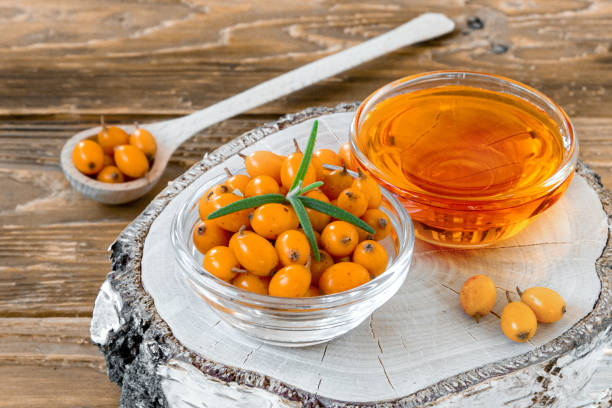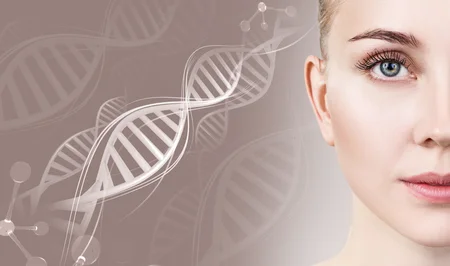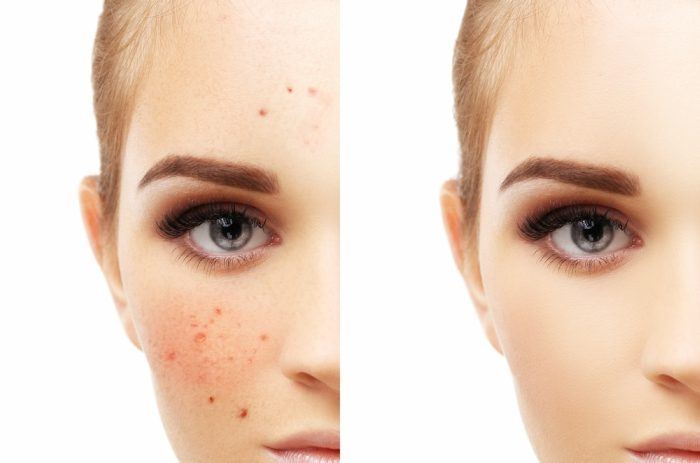Health Benefits
Why Sea Buckthorn is Good For Skin?
Sea buckthorn oil has become wildly popular as a skincare ingredient, but why? Turns out that this rare fruit has amazing nutrition that makes it stand out from other plant-based ingredients.
Nourishing Skin On A Cellular Level With Sea Buckthorn
Sea buckthorn plants grow in tough conditions in areas with high altitude and extreme weather conditions like in the Himalayan Mountain range. The plant’s natural habitat is what causes its berries and seeds to develop an amazing amount of nutrition.
A Host Of Omega Fatty Acids And Bioactive Nutrients
Sea buckthorn seed oil and berry oil both contain an array of omega fatty acids. The fatty acids alone nourish the skin in many different ways, but sea buckthorn oil also contains many other bioactive nutrients and vitamins. Sea buckthorn berry oil contains vitamins E and K, high levels of carotenoids, and flavonoids.

Omega 7 Benefits For Skin
One of the main uses for sea buckthorn oil traditionally has been to treat wounds and burns on skin. Studies have shown that omega 7, which is primarily found in sea buckthorn berries, is one of the reasons for its healing properties. One study looked at how omega 7 helped skin during the healing process and it found it has strong anti-inflammatory properties.
Omega-7 Promotes Collagen Synthesis
Scientists found that omega-7 was able to support collagen regeneration in skin cells due to its anti-inflammatory properties and the way they function in the skin. These findings show that omega-7 supplementation is likely an excellent option for improving overall skin health and fighting the effects of aging.
Omega-7 For Wound Healing
Once again, omega-7’s suspected anti-inflammatory properties came into question when scientists guessed that it could help when it came to wound healing. They found that omega-7’s anti-inflammatory action aided in healing wounds and specifically during the phases of tissue rebuilding. This study showed that omega-7 actually accelerated wound healing. Cellular health also means skin health. SBT oils make the perfect skincare products and can support your skin internally with supplements.

Sea Buckthorn Oil And Skin Health
So, we know that fatty acids are great for skin, but why is sea buckthorn oil so great for skin? Two of the lesser-known fatty acids in sea buckthorn oils have been shown to support skin in amazing ways!
Palmitic Acid Skin Benefits
Palmitic acid lacks a double bond in its chain because it’s a saturated fat, and there’s more of it in sea buckthorn berry oil than seed oil. This makes it more solid than other fatty acids and thus a better occlusive (meaning it protects the skin with a protective barrier that seals in moisture). This is also part of what makes sea buckthorn oil feel so good on skin and in skincare products.
Keratinocytes are the main kind of cell that make up our skin. Within keratinocytes are organelles which specialize in maintaining the protective barrier of the skin called lamellar bodies.
Omega 6 Skin Benefits
As we age, the lamellar bodies produce less lipids causing skin to weaken and becomes drier. Omega 6 is thought to actually reverse this process by accelerating the production of lipids in the skin, boosting cellular metabolization, protecting from water loss, and strengthening the lipid barrier.
Sea Buckthorn Oil For Psoriasis
One study focused on patients suffering from psoriasis who used sea buckthorn to help calm their skin and the results were overwhelmingly positive. The reality is that we are just starting to understand all of the amazing benefits that sea buckthorn oils can offer skin- but there are excellent products available now that can help.
A blend of undiluted sea buckthorn berry oil and sea buckthorn seed oil can actually help transform skin from the inside-out with regular use. Don’t just moisturize when you can NOURISH your skin on a cellular level.
Sea Buckthorn Seed Oil On UV Damaged Skin Cells
Each year, new research looking at the benefits of sea buckthorn oil comes out. Because of the lipids and other important nutrients in the oils, understanding how it can help skin in particular is a popular area of focus for researchers.
Researchers looked at sea buckthorn seed oil to see what it’s affects might be on human skin cells damaged by UV radiation. They looked at cells from different strata of the skin’s layers hoping to understand if the seed oil had a protective effect.
UV damage from the sun can go into the deepest layers of the dermis and epidermis. This kind of radiation causes disruption to many of the functions of the skin. The damage reduces the skin’s ability to heal using antioxidants causing oxidative stress. Some of the phytosterols found in sea buckthorn seed oil during the study were vitamins A, E, Beta-carotene, squalene, campesterol and brassica kol. The carotenoids are important for UV damaged skin due to their ability to stimulate collagen synthesis. The antioxidants and the phytosterols of sea buckthorn seed oil can also regulate inflammation processes in the cells.
UV Induced Oxidative Stress
UV related stress causes the skin to age prematurely by destroying collagen and elastin. The cell membranes can’t function as usual. UV damage also causes the generation of damaging cells which have imbalanced numbers of electrons. These cells interact with the membranes and proteins of the skin and cause severe damage to the skin.
Skin keeps stores of antioxidants to protect itself from this kind of radiation. In fact, the skin employs a number of complex chemical reactions to protect its cells from UV radiation. However, the skin’s natural reserve of antioxidants can be depleted over time and even in short periods of time depending on the severity of UV exposure.
Sea Buckthorn Seed Oil’s Antioxidant Properties
Researchers chose sea buckthorn seed oil specifically for its cytoprotective (cell protecting) properties. Sea buckthorn seed oil contains vitamins including E and C, sterols, and carotenoids. Some of the phytosterols found in sea buckthorn seed oil during the study were vitamins A, E, Beta-carotene, squalene, campesterol and brassicrakol.
The carotenoids are important for UV damaged skin due to their ability to stimulate collagen synthesis. The antioxidants and the phytosterols of sea buckthorn seed oil can also regulate inflammation processes in the cells. Other research shows that these key components make sea buckthorn seed oil a promising ingredient for the treatment of dermatitis. Based on that knowledge, researchers wanted to know if the oil would also be a good ingredient to help UV damaged skin cells.
How Sea Buckthorn Seed Oil Helped UV Damaged Skin
The treatment of sea buckthorn seed oil boosted the levels of fatty acids and phospholipids, along with the antioxidant levels. This helped to replenish the skin’s natural defenses and even slowed down the damaging processes of inflammation.
The oil helped to prevent that damage to membranes and preserved the cells’ natural ability to produce lipids. Sea buckthorn seed oil’s rich vitamin and polyphenolic compounds also had an antimicrobial affect which provided yet another layer of protection.When it came to UV damaged skin cells, sea buckthorn seed oil helped to nourish and revive the skin’s natural antioxidant defense system.

